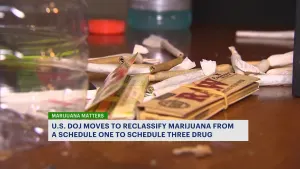More Stories
Officials with the state Association of Chiefs of Police met with New Jersey Attorney General Gurbir Grewal on Wednesday to try to resolve questions and issues they have with enforcing new marijuana laws now that adult-use recreational marijuana is legal.
New Jersey has consistently led all states in the number of marijuana arrests per capita. In some towns like Mendham and Pompton Plains, marijuana arrests have made up more than half of all arrests in some years. The legalization of marijuana in New Jersey will impact many police departments around the state and removes a large part of what they do.
Supporters of legalization say that this is the point and that maybe now police and tax dollars can go toward something more productive and less discriminatory.
RELATED: New Jersey police departments seek further guidance on marijuana laws following legalization
“What I hear from law enforcement folks around the country – not just New Jersey – is they’d rather be spending their time prosecuting major crimes, prosecuting violent criminals, building stronger ties with the community they’re policing, and cannabis prohibition does the opposite,” says DeVaughn Ward Sr., legislative counsel for the Marijuana Policy Project.
Advocates say that policing marijuana draws resources away from where police are needed the most and breaks down the trust between communities and law enforcement. They say that it is no longer a sensible policy position.
But police in New Jersey are now saying that the way the new law is written puts them in a very strange situation, especially when trying to enforce the law against possession by people under 21. Under the new law, minors are issued a warning, are not arrested, and police cannot alert their parents about the interaction.
“How many times are we going to come across maybe someone we coach with, maybe friends of family, and they say, ‘How come you didn’t tell me that my son or daughter had an interaction because they were using alcohol or marijuana?’ And we’re prohibited from doing that,” says New Jersey Association of Chiefs of Police 1st Vice President John Zebrowski. “I don’t think we’re doing our job or justice to those families…As a police officer, I think the obligation of being able to advise a parent on that initial intervention is very important.”
Under the new law only after the second warning is issued to someone under 18, can police notify the teen's parents or guardians.
More from News 12
2:18

Cannabis Contest Revisited: Turn To Tara team checks in on cannabis entrepreneur following 2-year documentary
1:55

Dispensary owners react to spending bill closing hemp loophole

Marijuana shops sue New York after they were allowed to open too close to schools
1:46

Checking in on legal cannabis dispensaries as city cracks down on illegal shops
1:50

Attorney claims NYC's 'Operation Padlock to Protect' cannabis campaign is unconstitutional
0:33
